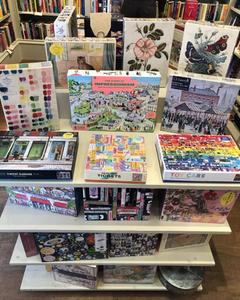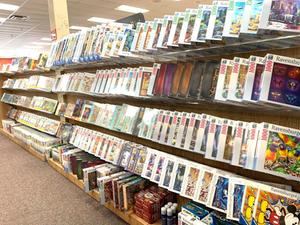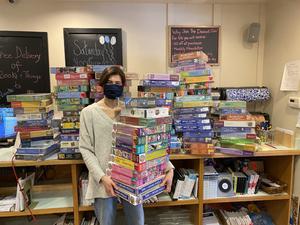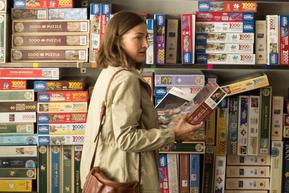I'm puzzled. In seven decades on the planet, I've never completed a jigsaw puzzle. I can recall some hopeless attempts when I was a kid that always resulted in abandonment or destruction (with four younger brothers, invasion of personal space was just part of the game). That I have a color deficiency and can't always distinguish between shades--dark red/brown, dark blue/purple, yellow/light green, etc.--was probably a contributing factor to my jigsaw puzzle-solving deficiency as well.

|
|
| At DIESEL, A Bookstore. | |
Why write about this now? I'll blame DIESEL, A Bookstore in Brentwood, Calif., which posted on Facebook earlier this week: "When it comes to our puzzle table, the only missing piece is you."
Yes I am (missing, that is), but for what it's worth I've had a virtual front-row seat watching the spike in jigsaw puzzle sales nationwide since our pandemic year began. I know how important a healthy puzzle inventory has become for indie booksellers trying to find their way through the Covid-19 retail morass.
Last April, NPR was already reporting that with Americans "stuck at home, demand for jigsaw puzzles is surging. Puzzlemakers can't keep up." It never stopped.
More recently, on the NBC hit series Shark Tank, Kaylin Marcotte struck a $500,000 deal with Mark Cuban to invest in her company Jiggy, which features "works of art designed by female artists from around the world with a percentage of each sale going directly back to the artist," the New York Business Journal reported, adding: "As the Covid-19 pandemic resulted in stay-at-home orders globally, Marcotte took the opportunity to market Jiggy to people stuck at home. The company said puzzle sales nearly quadrupled, which convinced Cuban of the brand's potential."
In addition to a flood of puzzle biz news over the past year, I've seen hundreds of social media posts by friends who showcased their jigsaw puzzles in every stage of evolution, from unopened box to jumbled pieces to partial image to finished picture to, yes, framed art on the wall.

|
|
| A wall of puzzles at Anderson's | |
So I have been paying attention. Beginning on National Puzzle Day, January 29, I even started collecting indie bookstore puzzle posts like trading cards (everybody needs a lockdown hobby). Here's a sampling: WORD Brooklyn; The Bookstore of Gloucester; the Bookstore of Glynn Ellen; Darvill's Bookstore; Vermont Book Shop; Greenlight Bookstore; Title Wave Books; Litchfield Books; Commonplace Reader; Kona Stories; Anderson's Bookshop; Main Street Books; Copperfield's Books.
So many puzzles, so much time.
I read somewhere that engraver and mapmaker John Spilsbury is credited with inventing the first jigsaw puzzle in 1767. He drew a map on a piece of wood, then used a jigsaw to cut it into small pieces. I hope that's true.

|
|
| At the Book Stall in Winnetka | |
In January, the comedy website Funny or Die took a shot at the jigsaw puzzle craze, suggesting they are bad for us and must be stopped: "Step one, you buy a puzzle with your hard earned money. Step two, you stare at the pieces dumped on your coffee table going, 'Uhhhhhh where's the blue piece? No that's the wrong blue piece. That's the wrong blue piece. That's the wrong b--' etcetera for hours, even days. Step three, eventually you finish the puzzle and discover that, surprise surprise, it's exactly the picture it told you it was going to be. Now what? Now you do it all over again? Excuse me? Do you know how insane that is?!... Go buy a desk from IKEA and spend your free time putting it together and taking it apart, since we're doing things that don't make any sense. At least whenever you decide you're finally done you'd have a goddamn desk."
 |
|
| A scene from Puzzle | |
It's easy to make fun of puzzleheads, but here's a little secret: I wish I did have the patience, ability and color-awareness to be a jigsaw puzzle master. I did not know this until a couple of years ago, when I first saw Marc Turtletaub's film Puzzle, starring Kelly Macdonald as Agnes, a suburban housewife who discovers she has world-class gifts as a jigsaw puzzle solver; and the late Irrfan Khan as Robert, a former puzzle champion who partners with her to compete in team tournaments. I didn't know such things existed, but quickly wished I had the talent to be in one.
"Life is messy," Robert says. "It doesn't make any goddamn sense. Sorry to break the news to you. Life's just random. Everything's random. My success, you here now. There's nothing we can do to control anything. But when you complete a puzzle, when you finish it, you know that you have made all the right choices. No matter how many wrong pieces you tried to fit into a wrong place, at the very end, everything makes one perfect picture. What other pursuits can give you that kind of perfection?"
Jigsaw puzzles have served a lot of folks well--economically, creatively, psychologically, emotionally--for more than a year. As Robert observes in Puzzle: "It's a way... to control the chaos." And who can argue with that solution?

